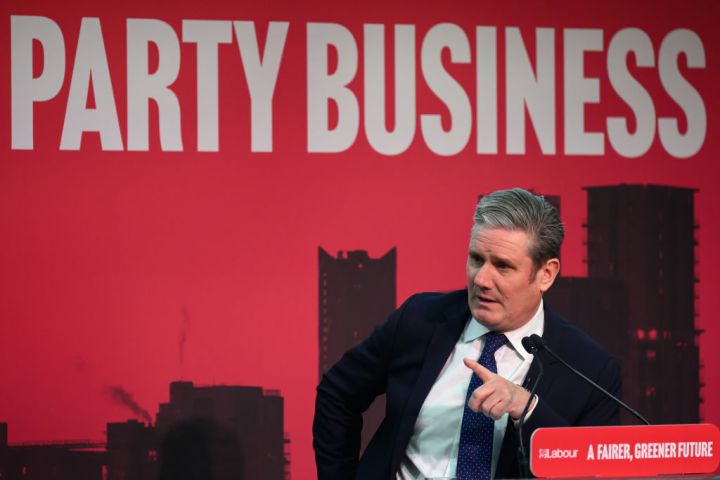With Labour twenty points ahead of the Conservatives and leading in most policy areas – including, crucially, the ability to best manage the economy – the next election seems to be Keir Starmer’s to lose. Divided and distraught Conservative MPs appear to have accepted their fate. Indeed, some supporters of Boris Johnson and Liz Truss relish the prospect of opposition so they can properly settle accounts with their enemies.
Yet Rishi Sunak still has a slim hope of retaining power, should the economy start to right itself by 2024 and if he can convince voters a Labour government would ruin any observable recovery. This requires him to attack Labour’s bona fides and especially those of its leader.
In the run-up to the next election Conservatives will do their best to argue that Starmer cannot be trusted. They will cast him as a woke elitist in hock to militant union barons, the Remainer who thought Jeremy Corbyn should be Prime Minister and wanted to betray the Brexit vote. Sunak has already rehearsed such attack lines at Prime Minister’s Questions; they too have been echoed in the Tory press however much their owners loathe the current Conservative leader.
None of this will be news to Starmer. Indeed, since becoming leader in early 2020 he has reiterated time and time again that Corbyn’s party is dead and buried. This has been more than a matter of words. The far-left has been side-lined in Parliament and thousands of Corbyn supporters have quit the party; Corbyn himself is no longer a Labour MP and should he stand in North Islington at the next election it will be as an independent.
Many of the more radical proposals that bulked out the pages of Labour’s 2019 manifesto have been dropped while shadow chancellor Rachel Reeves – almost a non-person during the Corbyn years – speaks with apparent pride of Labour being a ‘business-friendly’ party. Starmer now accepts Brexit; the Union Jack, and not the Palestinian flag, is flown at party conferences. The Labour leader has also avoided taking a firm position during the current wave of strikes.
Given the party’s position in the polls, some might think Starmer should continue this super-cautious strategy of closing down Conservative attack lines, that simply not being Corbyn will be enough to see him enter Downing Street. After all, being present but not involved in the fall of Boris Johnson and Liz Truss and the collapse of Conservative party support during 2022 has worked for Labour so far.
Starmer needs to go on the front foot and explain in the clearest possible terms who he is and what his party stands for
Yet this safety-first approach also contains some risks. For however incompetent and out-of-touch the Conservatives currently appear, Labour still needs a positive message of hope, that it embodies change for the better. This has certainly been the case when Labour seized power after earlier long periods of Conservative rule.
In 1945 Clement Attlee called on the country to ‘face the future’; Harold Wilson sought to mobilise the ‘white heat of technological change’ in 1964. Even Tony Blair in 1997 claimed ‘things can only get better’ with him as prime minister. In other words, Labour has to be more than not-something – a political placebo if you will – if only because that makes it more difficult for Conservatives to define the party in their own terms. Starmer’s current strategy means few voters know for what he actually stands, and that means he remains vulnerable to Conservative claims he is inauthentic and therefore untrustworthy.
To be fair to the Labour leader he has attempted to define himself and his party in positive terms. Nevertheless, few listened during the Covid crisis and while Labour trailed in the polls. For those with the patience to listen to his over-long and opaque speeches some themes did however emerge, notably the promise of ‘security’.
If anything, Labour has too many ideas and policies. Under Starmer they have lurked in the background, the leadership too afraid to announce them to the public. But in 2023 with an apparently secure poll lead, one which means more Britons will take his words seriously, Starmer needs to go on the front foot and explain in the clearest possible terms who he is and what his party stands for. If anything, this would lock in the support of those who just now say they will abandon the Conservatives and vote Labour at the next election.
This will also have another and more important purpose. Maybe after a landslide win or possibly only as a minority government, Starmer could enter Downing Street after the next election. In this likely event, he will need a positive mandate to tackle the many problems Sunak is currently failing to address.
Given the dire state of the economy Labour will likely inherit, Starmer told his party’s annual conference his government would ‘not being able to do things – good Labour things – as quickly as we might like’. But deflating expectations, and simply not being Corbyn or Sunak will not be enough to sustain a Starmer government. Indeed, without a clear and defined purpose it is more than possible Starmer’s time in Downing Street will be as rudderless as Sunak’s is. It could turn out to be a failed one-term affair, to be replaced by whoever wins the bitter Conservative civil war.






Comments